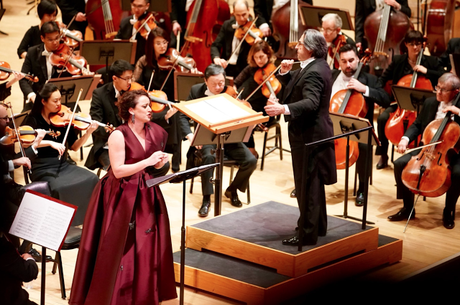by Paul J. Pelkonen

Riccardo Muti (on podium) leads the Chicago Symphony Orchestra and mezzo-soprano Clémentine Margaine
at Carnegie Hall on Friday night. Photo © 2018 Chicago Symphony Orchestra.
The concert began with Stravinsky. Not the bombast of The Firebird or the pagan pounding of The Rite of Spring, but the Scherzo Fantastique, an early orchestral work that shows the influence of Stravinsky’s teacher and mentor Nikolai Rimsky-Korsakov. The woodwinds led the way here, lilting through a delicate dance. The strings followed, tracing spidery lines, with three harps adding depth and color to the orchestral palette. It was a type of opening that the audience did not expect.
The tuba and trombones then entered, taking seats right at the front of the orchestra for the next piece: the Low Brass Concerto by Jennifer Higdon. One of a number of concertos written by Ms. Higdon for unusual soloists, this single movement cast in four parts displayed the ability of the three trombonists and tuba to do much more than just the usual heavy lifting in support of the horns. Ms. Higdon allowed each of the quartet to “speak” with the individual voice of their instrument, comment on each other's lines and then raise their voices in a chorale that would have made Anton Bruckner (or Sir Georg Solti) proud.
The second half featured a somewhat nautical theme. Ernest Chausson’s Poeme de l’amour et la mer is a deep, headlong plunge into the waters of a composer who (had his life not ended early in an unlikely bicycle accident) might have fought the Wagnerian revolution upon the vasty fields of France. Chausson's music, which exists only as a handful of works, is woven from the same luxuriant thread as Tristan and Parsifal. (In other words, it represents everything that Debussy eventually rebelled against.)
Mezzo-soprano Clémentine Margaine was the discovery here. She has a plush and velvety voice that caressed the phrasing in “La fleur des eaux”, riding crests and breakers of orchestration toward some unknown but rocky shore. The central orchestral Interlude offered a brief shelter from this flood of chromaticism. Then the mezzo rose again, this time pouring out “La mort de l’amour” a poem of love and death in purple prose that would have made the old master of Bayreuth blush. (Perhaps Debussy had a point.)
The concert concludes with much more modern and agreeable water music: the Four Sea Interludes from Benjamin Britten’s opera Peter Grimes. The slow Dawn rose majestically, with Britten’s pointillist technique using winds and strings to suggest the sleepy waking of the village where the opera is set. The sharp chords and chime bells of Sunday Morning reminded one of the Coronation Scene from Boris Godunov, applying that pomp to the self-important villages with a caustic brush. Moonlight was all delicacy and tension. It was in the final Storm that all hell broke loose. Here at last was that burly, burnished Chicago sound, as the tempest raged and thundered. A
However that was not the end. Mr. Muti (who is noted for among other things a distaste for offering encores) resumed the podium. He offered a short anecdote of Arturo Toscanini and that fiery conductor’s departure from Italy in 1931. At a memorial concert for the composer Giuseppe Martucci, Toscanini had refused to conduct the Fascist anthem "Giovanezza." He was beaten up by Fascist thugs, packed his bags and left Italy. Mr. Muti then offered the plush and searching performance of Martucci's Notturno. It was a bit of balm to the ears, expertly delivered and making a sharp and necessary political point.

